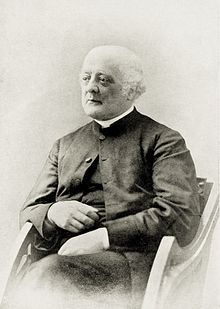Frederick Ouseley: Difference between revisions
m add {{Use dmy dates}} |
|||
| Line 111: | Line 111: | ||
[[Category:English male classical composers]] |
[[Category:English male classical composers]] |
||
[[Category:Oratorio composers]] |
[[Category:Oratorio composers]] |
||
[[Category:Male classical organists]] |
|||
Revision as of 03:30, 1 October 2022
This article includes a list of general references, but it lacks sufficient corresponding inline citations. (February 2018) |
Sir Frederick Ouseley, Bt | |
|---|---|
 | |
| Born | 12 August 1825 London, England |
| Died | 6 April 1889 (aged 63) |
| Era | Romantic |
| Works | List of Works |
Sir Frederick Arthur Gore Ouseley, 2nd Baronet (12 August 1825 – 6 April 1889) was an English composer, organist, musicologist and priest.
Biography
Frederick Ouseley was born in London, the son of Sir Gore Ouseley, and manifested an extraordinary precocity in music, composing an opera (L'Isola disabitata) at the age of eight years. In 1844, having succeeded to the baronetcy, he entered at Christ Church, Oxford, and graduated BA in 1846 and MA in 1849. He was ordained in the latter year, and, as curate of St. Paul's Church, Knightsbridge, served the parish of St. Barnabas, Pimlico until 1851.[1]
Throughout his life, Ouseley experienced a social conflict between his aristocratic heritage and his interest in the performance of Anglican church music, an activity which was seen as beneath someone of his stature. In 1850 he took the degree of Mus.B. at the University of Oxford, and four years afterwards that of Mus.D., his exercise being the oratorio The Martyrdom of St Polycarp. He was Heather Professor of Music at Oxford from 1855 to 1889. In 1856 Ouseley both founded and endowed with his own funds St Michael's College on the outskirts of Tenbury Wells, a choir school intended to serve as a model for Anglican church music. He also became the school's first Warden.[2]
Ouseley's works, which are little known today, include a second oratorio, Hagar (Hereford, 1873), a great number of services and anthems, psalm chants,[3] cantatas, chamber music, organ pieces and songs. Among his instructional treaties on harmony, counterpoint, fugue, and composition are Harmony (1868) and Counterpoint (1869) and Musical Form (1875).[1]
He also added a series of chapters on English music to the English translation of Emil Naumann's History of Music, the subject having been practically ignored in the German treatise.[1]
Ouseley died in Hereford, where he had been precentor at Hereford Cathedral since 1855. Probably his most notable student was Sir John Stainer.
Works
Choral
[unfinished]
- Anthems:
- All the kings of the earth
- And there was a pure river of Water of life
- And there was a war in heaven
- Ascribe ye greatness
- Awake, thou that sleepest
- Behold, how good and joyful
- Behold now, praise the Lord
- Be merciful unto me
- Blessed be the Lord God of Israel
- Blessed be Thou
- Blessed is he whose unrighteousness
- Blessed is the man
- Christ is risen from the dead
- Except the Lord build the house
- From the rising of the sun
- Give thanks, O Israel
- Great is the Lord
- Happy is the man
- Haste Thee, O God
- How goodly are the tents
- Is it nothing to you
- It came even to pass
- Jerusalem on high
- O Saviour of the world
- Oratorios
- St Polycarp (1854)
- Hagar (Hereford Festival, 1873)
- Services
- Evening Service in B flat
- Evening Service in E flat
- Miscellaneous
- Gloria in D
- Te Deum in D
- Te Deum in F
- Hymn tunes
- Contemplation (When all thy mercies, O my God)
- Hereford (When wounded sore the stricken heart)
- Bewdley (Children of the heavenly King)
- St. Gabriel.
References
- ^ a b c Chisholm 1911.
- ^ Tenbury Wells and the Teme Valley, 2007, p10
- ^ Meijer, Ton. "Ouseley, Frederick Arthur Gore (1825-1889)". An index to Anglican Chants. Retrieved 17 September 2020.
- Attribution
- This article incorporates text from a publication now in the public domain: Chisholm, Hugh, ed. (1911). "Ouseley, Sir Frederick Arthur Gore". Encyclopædia Britannica (11th ed.). Cambridge University Press.
External links
- 1825 births
- 1889 deaths
- 19th-century English musicians
- 19th-century British composers
- 19th-century British male musicians
- 19th-century classical composers
- Baronets in the Baronetage of the United Kingdom
- English classical composers
- English Romantic composers
- English classical organists
- British male organists
- English music theorists
- 19th-century English Anglican priests
- Heather Professors of Music
- English male classical composers
- Oratorio composers
- Male classical organists
